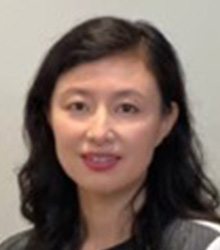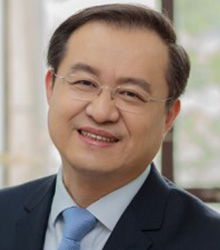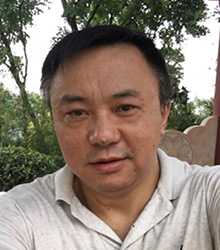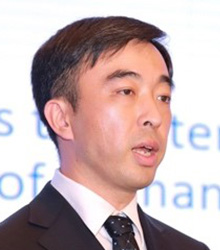Symposiums--SIGAPP China(Venue : Wanda Reign )
Established in May 2019, SigAPP of ACM China is a professional committee for computer applications, providing practitioners and researchers with opportunities in computer application fields to share and exchange. The committee dedicates to extending advanced computing technology to the applications, promoting standardization, and promoting cooperation in the study, research, and production. The topics include, but are not limited to: computing technology, computer network, Internet of Things, resource management, artificial intelligence, human-computer interaction, computing-related standards, and computer applications in various fields of the national economy.
Organizers
General Chair
Zhongwen Guo (Ocean University of China,Professor)
Minglu Li (Zhejiang Normal University,Professor)
Vice Chairs
Guangtao Xue (Shanghai Jiao Tong University, Professor)
Jian Peng (Sichuan University, Professor)
PC Chair
Feng Hong (Ocean University of China,Professor)
Chao Liu (Ocean University of China, Associate Professor)
Call-for-Paper
The 2021 Annual Conference's theme is "Industrial Internet of Things Applications and Prospects," inviting domestic and foreign practitioners and researchers engaged in industrial IoT research and implementation to discuss key technologies and typical applications. The topics include, but are not limited to: computing technology, computer network, Internet of Things, resource management, artificial intelligence, human-computer interaction, computing-related standards, and their applications in industrial IoT systems.
SigAPP(Special Interest Group on Applied Computing )专题研讨会计划
| Date(2023-07-29)Location(TBC) | ||||
| Time | Talks | Speaker | Moderator | |
| 14:00 - 14:10 | Zhongwen Guo,Professor, Ocean University of China,Co-chair of ACM SIGAPP China | |||
| 14:10 - 14:40 | Keynote | Acoustic Sensing and Communication Using Metasurface | Lili Qiu,Assistant managing director of Microsoft Research Asia, IEEE/ACM Fellow, Chair of ACM SIGMOBILE | |
| 14:40 - 15:10 | Keynote | Tianruo Yang,Vice President of Hainan University,CanadianAcademy of Engineering/ European Academy of Sciences,IEEE Fellow | ||
| 15:10- 15:25 | Coffee Break(Poster) | |||
| 15:25 - 15:55 | Keynote | Machine Learning Solutions in Complex Systems: The Good, the Bad, and the Ugly | Bo Li, Chair Professor,IEEE Fellow | Minglu Li,Professor, Zhejiang Normal University,Co-chair of ACM SIGAPP China,IEEE Fellow |
| 15:55 - 16:25 | Keynote | Introduction to the IEEE Standard Development Process | Jiajia Liu,IEEE China高级经理 | |
| 16:25 - 16:55 | Panel | 待定 | Zhongwen Guo, Minglu Li, Tianruo Yang, Bo Li, Jiajia Liu | |
Speakers

Keynote: Acoustic Sensing and Communication Using Metasurface

Lili Qiu
Assistant managing director of Microsoft Research Asia
Abstract:
Acoustic sensing and communication are increasingly popular owing to widely available devices that support them. Yet the sensing resolution and communication range are still limited due to limited bandwidth and sharp decay in the signal at inaudible frequencies. In this talk, I will present a novel acoustic system that leverages a low-cost metasurface to significantly enhance SNR, acoustic sensing accuracy, and acoustic communication reliability over a wide range of scenarios.
BIO:
Dr. Lili Qiu is an assistant managing director of Microsoft Research Asia and is mainly responsible for overseeing the research, as well as the collaboration with industries, universities, and research institutes, at Microsoft Research Asia (Shanghai). Dr. Qiu is a leader in the fields of Internet, wireless networking, and sensing. She got PhD in Computer Science from Cornell University in 2001. She began her career at Microsoft Research Redmond, working as a researcher in the System & Networking Group from 2001 to 2004. In 2005, she joined the University of Texas at Austin as an assistant professor in the Department of Computer Science. Recognized for her outstanding achievements, she was later promoted to a tenured full professor. Her significant achievements have earned her several prestigious honors, including National Academy of Inventors (NAI) Fellow, ACM Fellow, and IEEE Fellow. Additionally, she serves as the chair of ACM SIGMOBILE. She has been recognized as an ACM Distinguished Scientist and received the NSF CAREER award, among many other honors.

Keynote: 待定

Xue Wang
Vice Dean of the Department of Precision Instrument and the State Key Laboratory of Precision Measurements Technology and Instruments, Tsinghua University
Abstract:
BIO:Prof. Yang graduated from the Department of Computer Science at Tsinghua University, obtaining dual bachelor's degrees in Computer Science and Applied Physics. He earned his Ph.D. in Computer Science from the University of Victoria in Canada. Currently, he serves as the Vice President for Academic Affairs at Hainan University, as well as the Dean of the School of Computer Science and Technology. He is a Fellow of the Canadian Academy of Engineering, a Fellow of the Canadian Academy of Engineering Research, a Fellow of the European Academy of Sciences, and a Fellow of IEEE/IET/AAIA. He is recognized as one of the top 1000 computer and electronic scientists in the world and ranks in the top 2% of global scientists according to Stanford University. He is also a highly cited researcher according to Clarivate Analytics and an ACM Distinguished Scientist. His main research focus lies in the field of human-machine-object intelligence. In this field, Prof. Yang has published over 500 international journal papers, including over 250 top-tier papers in IEEE and ACM journals. Eight of his articles have been selected as ESI hot papers (top 0.1%), and 40 papers have been recognized as ESI highly cited papers (top 1%). He has received numerous international awards and honors, including the John B. Stirling Medal from the Canadian Academy of Engineering (2021), the IEEE Sensor Council Technical Achievement Award (2020), and the IEEE Canada C. C. Gotlieb Computer Achievement Award (2020), among others.

Keynote:Machine Learning Solutions in Complex Systems: The Good, the Bad, and the Ugly

Bo Li
Chair Professor of Hong Kong University of Science and Technology
Abstract:
Decision-making problems are ubiquitous in computer systems. Examples include cluster resource management and cloud service configuration, to name a few. These decision-making tasks are usually performed online, and the results critically determine the system performance and operational cost. As systems grow increasingly larger, these tasks become too complex to model accurately and are usually solved by heuristics that require manual testing and tuning in practice. In recent years, using machine learning as an alternative to human-generated heuristics for decision making has gained significant momentum in complex systems. Through techniques like reinforcement learning and meta learning, systems can now learn to make superior decisions from experience interacting with the environment. However, it is important to recognize that machine learning is not a panacea for all decision-making tasks. In this talk, I will present our recent efforts in pursuit of this vision and share our experiences in deploying them in real systems, including the good, the bad, and the ugly.
BIO:
LI Bo is a Chair Professor in the Department of Computer Science and Engineering, Hong Kong University of Science and Technology, where he has been affiliated with since 1996. He holds the Cheung Kong Chair Professor in Shanghai Jiao Tong University. He is a Fellow of IEEE for "contribution to content distributions via the Internet". He received the Young Investigator Award from the National Natural Science Foundation of China (NSFC) in 2005. He served as a Distinguished Lecturer for IEEE Communications Society (2006-2007). He was a co-recipient for three Best Paper Awards from IEEE, and the Best System Track Paper in ACM Multimedia (2009). He made original contributions on the proxy placement for content distribution networks (CDNs), in which his IEEE INFOCOM (1999) paper "On the Optimal Placement of Web Proxies in the Internet" was the first work addressing this problem. He made pioneering contributions in large-scale Peer-to-Peer live video streaming; specifically, the system, Coolstreaming (2004-2005) (Google entries over 2,000,000) was credited as the first large-scale Peer-to-Peer live video streaming system in the world. This work appeared in IEEE INFOCOM (2005) has not only been highly cited, but also spearheaded a momentum in peer-to-peer streaming, with no fewer than a dozen successful companies such as PPLive, PPStream, UUSee and YahooBB (Japan) adopting the same mesh-based pull streaming technique to deliver live media content to millions of users. He also led a team developing a real-world peer-assisted online hosting system, FS2You (2007-2008) (Google.cn entries over 4,000,000 in 2009) that has attracted millions of downloads worldwide.

Keynote:Introduction to the IEEE Standard Development Process

Jiajia Liu
Senior Standard Director of IEEE China
Abstract:
Introduction to the organization structure, operational model, and scope of activities of the Institute of Electrical and Electronics Engineers (IEEE) and its Standards Association (IEEE SA), as well as the basic process of developing IEEE standards.
BIO:
Dr.Liu is the Standards Manager at the IEEE China Office. Since 2014, he has been involved in the development of international standards and has participated in international standardization projects of IEEE and ISO. He has been responsible for a sub-project in the research of key international standards for strategic emerging industries under the National Key Research and Development Program of the Ministry of Science and Technology. Since 2020, he has served as the Standards Manager at the IEEE China Office, providing guidance and support in the process for nearly 70 IEEE standard working groups, including the IEEE Computer Society, Power and Energy Society, Communications Society, Consumer Technology Society, and Photonics Society.

